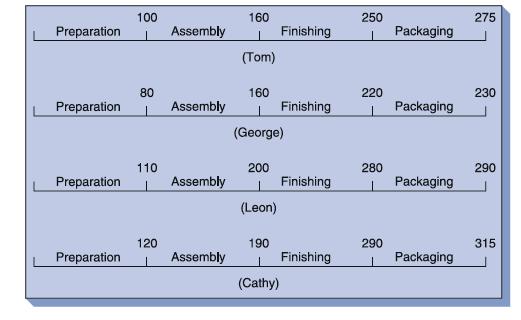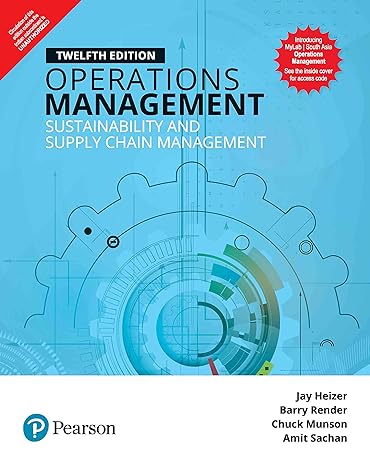In 2015, George Wright started the Old Oregon Wood Store to manufacture Old Oregon tables. Each table
Question:
In 2015, George Wright started the Old Oregon Wood Store to manufacture Old Oregon tables. Each table is carefully constructed by hand using the highest-quality oak. Old Oregon tables can support more than 500 pounds, and since the start of the Old Oregon Wood Store, not one table has been returned because of faulty workmanship or structural problems. In addition to being rugged, each table is beautifully finished using a urethane varnish that George developed over 20 years of working with wood-finishing materials.
The manufacturing process consists of four steps: preparation, assembly, finishing, and packaging. Each step is performed by one person. In addition to overseeing the entire operation, George does all of the finishing. Tom Surowski performs the preparation step, which involves cutting and forming the basic components of the tables. Leon Davis is in charge of the assembly, and Cathy Stark performs the packaging.
Although each person is responsible for only one step in the manufacturing process, everyone can perform any one of the steps. It is George’s policy that occasionally everyone should complete several tables on his or her own without any help or assistance. A small competition is used to see who can complete an entire table in the least amount of time. George maintains average total and intermediate completion times.
The data are shown in Figure 15.7.
 It takes Cathy longer than the other employees to construct an Old Oregon table. In addition to being slower than the other employees, Cathy is also unhappy about her current responsibility of packaging, which leaves her idle most of the day. Her first preference is finishing, and her second preference is preparation. In addition to quality, George is concerned with costs and efficiency. When one of the employees misses a day, it causes major scheduling problems. In some cases, George assigns another employee overtime to complete the necessary work.
It takes Cathy longer than the other employees to construct an Old Oregon table. In addition to being slower than the other employees, Cathy is also unhappy about her current responsibility of packaging, which leaves her idle most of the day. Her first preference is finishing, and her second preference is preparation. In addition to quality, George is concerned with costs and efficiency. When one of the employees misses a day, it causes major scheduling problems. In some cases, George assigns another employee overtime to complete the necessary work.
At other times, George simply waits until the employee returns to work to complete his or her step in the manufacturing process. Both solutions cause problems. Overtime is expensive, and waiting causes delays and sometimes stops the entire manufacturing process.
To overcome some of these problems, Randy Lane was hired. Randy’s major duties are to perform miscellaneous jobs and to help out if one of the employees is absent. George has given Randy training in all phases of the manufacturing process, and he is pleased with the speed at which Randy has been able to learn how to completely assemble Old Oregon tables. Randy’s average total and intermediate completion times are given in Figure 15.8.

Discussion Questions
1. What is the fastest way to manufacture Old Oregon tables using the original crew? How many could be made per day?
2. Would production rates and quantities change significantly if George would allow Randy to perform one of the four functions and make one of the original crew the backup person?
3. What is the fastest time to manufacture a table with the original crew if Cathy is moved to either preparation or finishing?
4. Whoever performs the packaging function is severely underutilized. Can you find a better way of utilizing the four- or five-person crew than either giving each a single job or allowing each to manufacture an entire table? How many tables could be manufactured per day with this scheme?
Step by Step Answer:

Operations Management Sustainability And Supply Chain Management
ISBN: 234357
12th Edition
Authors: CHUCK MUNSON & AMIT SACHAN AND . JAY HEIZER , BARRY RENDER





